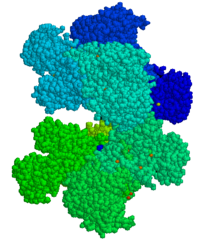
Photo from wikipedia
Corynebacterium glutamicum is an important strain for the industrial production of amino acids, but the fermentation of L-methionine has not been realized. The purpose of this study is to clarify… Click to show full abstract
Corynebacterium glutamicum is an important strain for the industrial production of amino acids, but the fermentation of L-methionine has not been realized. The purpose of this study is to clarify the effect of reducing power NADPH on L-methionine synthesis. Site-directed mutagenesis of zwf and gnd genes in pentose phosphate pathway relieved feedback inhibition, increased NADPH supply by 151.8%, and increased L-methionine production by 28.3%; Heterologous expression of gapC gene to introduce NADP+ dependent glyceraldehyde-3-phosphate dehydrogenase increased NADPH supply by 75.0% and L-methionine production by 48.7%; Heterologous expression of pntAB gene to introduce membrane-integral nicotinamide nucleotide transhydrogenase increased NADPH by 89.2% and L-methionine production by 35.9%. Finally, the engineering strain YM6 with a high NADPH supply was constructed, which increased the NADPH supply by 348.2% and the L-methionine production by 64.1%. The analysis of metabolic flux showed that YM6 significantly increased the glycolytic flux, including the metabolic flux of metabolites such as glycosyldehyde-3-phosphate, dihydroxyacetate phosphate, 3-phosphoglycate and pyruvate, and the significant increase of L-methionine flux also confirmed the increase of its synthesis. This study provides a research basis for the systematic metabolic engineering construction of L-methionine high-yield engineering strains.
Journal Title: Foods
Year Published: 2022
Link to full text (if available)
Share on Social Media: Sign Up to like & get
recommendations!